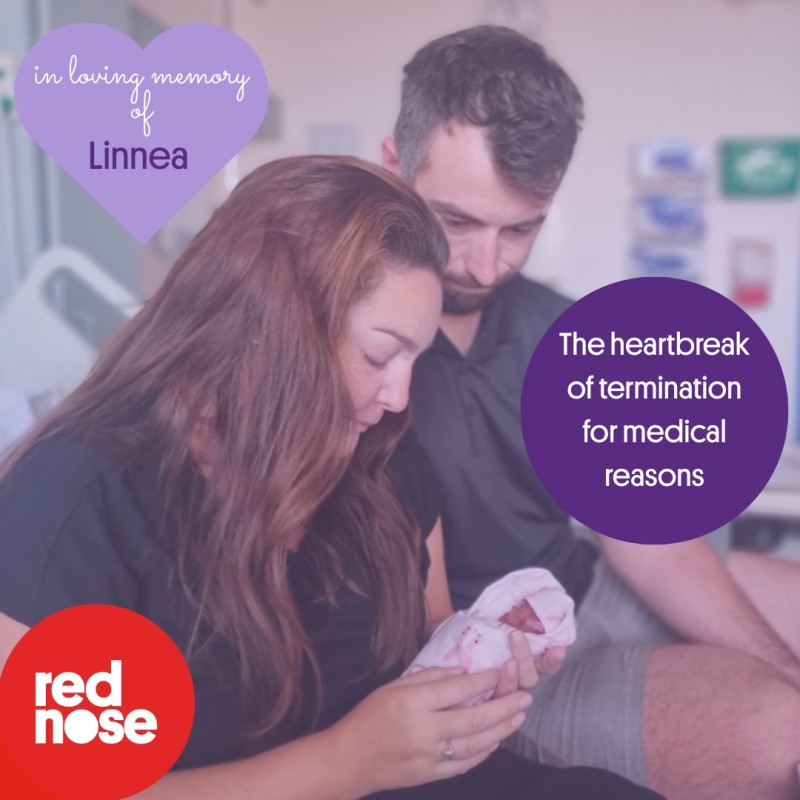By Rhiannon Kavanagh
Our TFMR wasn’t our first heartbreak. For over four years, we’d been trying to conceive our first child. In that time, I experienced three miscarriages — four babies lost. Each time I saw two pink lines, hope surged through me. Maybe this time. Maybe this would be our turn. But every loss cracked me open a little more. Grief layered upon grief. We tried IVF too - three failed embryo transfers, three more gut-wrenching disappointments.

Still, I pressed on, clinging to every thread of hope.
Eventually, a new doctor gave us a real one.
After an exploratory laparoscopy, I was diagnosed with silent moderate endometriosis. It felt like an answer. A reason. A way forward, like being given a map after wandering in the dark with no answers for so long.
Our first double embryo transfer post-surgery worked. I can still feel the explosion of joy in my chest when we saw two little flickering heartbeats on the screen. Twins. Again! I wept — bursting with joy. We’re really going to bring two babies home. What a miracle. I was finally going to get my family.
But joy is fragile when dealing with infertility.
A week later, I was shattered—again. Twin B was gone. Another wave of grief crashed over me, just as I had dared to believe. I grieved deeply for that tiny life, but tried to hold onto gratitude that one baby was still with us. Nausea hit hard, but I didn’t mind. I welcomed the sickness, feeling like maybe, finally, this was our time. I let myself believe. I let my guard down. I let myself dream.
At 13 weeks, I went in for an early anatomy scan, excited just to see our baby again. Their little heart was still beating, and I smiled with relief. Then the sonographer paused: “There’s something wrong with your baby’s tummy.”
The world tilted.
My head was full of questions.
‘What do you mean? What’s wrong? Is our baby okay?’
They couldn’t say much. Just that a report would be sent to my GP but it was severe enough that I needed to see her that same day.
The GP was honest. It didn’t look good. Initially, our baby was misdiagnosed with a giant omphalocele and partial ectopia cordis. She referred us to Maternal Fetal Medicine, but they wouldn’t see us until 16 weeks. We spent three agonising weeks over Christmas and New Year in a haze of fear and frantic research, slowly coming to understand what we might be facing.
When we finally met with Maternal Fetal Medicine, the truth hit harder than I could’ve imagined. It wasn’t an omphalocele. Our baby didn’t have an abdominal wall at all. All their organs were outside their body. A non-genetic one in a million rare birth defect diagnosis completely incompatible with life.
We found out she was a girl.
I named her Linnea, after the Linnaea borealis flower, known as the twinflower, for the sibling she had lost.
The next week, I was induced. At 17 weeks, on January 15th, 2024, Linnea was born and died. She was so tiny, fitting perfectly into the palm of my hand.
No one can prepare you for what TFMR feels like. Aware you are walking into the hospital to birth your baby knowing you won’t be bringing them home. It’s holding your child and memorising every feature of their tiny face because that’s all you’ll ever have. It’s seeing your partner break down and sob with your precious baby in their giant hands, being unable to take that pain from them also. It’s love so fierce and consuming that you bear the impossible pain so your baby doesn’t have to.
TFMR is not a choice - it’s an act of mercy wrapped in overwhelming love and unbearable grief. We took on that lifetime of pain so Linnea wouldn’t suffer a moment.
I reached out to Red Nose early, knowing I couldn’t carry this alone. Their Hospital to Home program got me through my darkest weeks. My first counsellor helped me wade through the flood of grief and tears and sat with me in the silence. I found solace in their in-person support groups, spaces where I could speak Linnea’s name and cry freely. I still have ongoing counselling with them. They give me tools to keep breathing when I didn’t think I could. I owe them so much. I’ll never stop being thankful.
If you’re going through TFMR right now, I am so deeply sorry. It is the kind of pain that steals your breath, the kind that feels endless. But please know this: you will survive. You will feel the sun again. You will laugh. You will hope. The pain doesn’t vanish, but you learn to live with it. I think of Linnea every hour of every day. She is woven into the fabric of my life, remembered always, as all the tiny lives gone too soon.
Rhiannon and her husband Christopher have been dealing with infertility and pregnancy loss for the past five and half years, losing six babies over four pregnancies.
